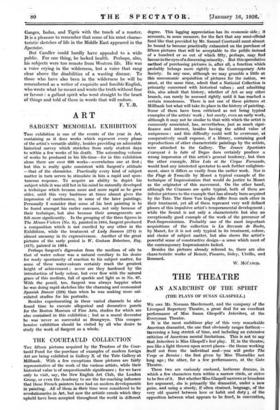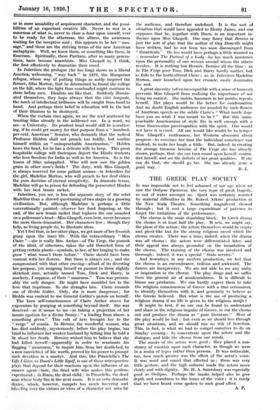THE THEATRE
WE owe Mr. Norman Macdermott, and the company Of the Liverpool Repertory Theatre, a great deal for an excellent performance of Miss Susan Glaspell's Inheritors, at the Everyman Theatre.
It is the most ambitious play of this very remarkable American dramatist, the one that obviously ranges farthest- tanversing a long stretch of time, and including an extensive criticism of American mental limitations. This is not to' say that Inheritors is Miss Glaspell's best Oak. If, in the theatre; you like a light thrown upon secret places—the theme working itself out from the individual soul—you will prefer The Verge or Bernice : the first given by Miss Thorndike .not long, ago ; the other, for a few performances, at the: Gate Theatre..
These two are curiously enclosed, hothouse dramas, in which a few characters turn within a narrow circle, or strive to be free of it. But whether Miss Glaspell narrows or broadens her argument, she is primarily the dramatist, under a 'new guise, and using a sturdy, if often strained, language, of the very old quarrel between love or habit and duty ; of the opposition between what appears to be fixed, in convention; or in mere amiability of acquiescent character, and, the possi. bilities of an expectant creative life. Never to rest in a sameness of what is, never to close a door upon oneself, ever to be ready for the otherness, the alhtess, the awareness waiting for the receptive soul ; this appears to be her " mes- sage," and these are the striving terms of the new American metaphysic. Well, we knew them, or something like them, in Emerson. Spiritually, these Puritans, after so many genera- tions, have become anarchists. Miss Glaspell is, I think, the first effectively to dramatize their creed.
In Inheritors the prologue (far too long) shows us a liberal America, welcoming, " way back " in 1879, the Hungarian refugee, whose way of putting things so nobly inspired the farmer, Silas Morton, that he determined to found the college on the hill; where the light thus vouchsafed might continue to shine before men. Idealists are like that. Suddenly illumin- ated themselves, they hope always that the vitai lampada, the torch of intellectual brilliance will be caught from hand to hand. And perhaps their belief in education will be the last of their illusions to be destroyed.
When the curtain rises again, we see the seed scattered by trusting Silas already in the mildewed ear. In a word, we see—a University. Its prudent head would still be a-scatter- ing, if he could get money for that purpose from a " hundred- per-cerit. American " Senator, who demands that the radical Professor Holden shall not preach Vito boldly, but confine himself within an " unimpeachable Americanism." Holden bows the head, for he has a delicate wife to keep. This great hospitable college will thereupon deport the Hindu students who love freedom for India as 'well as for America: So is the lesson of Silas misapplied. Who will now sow the golden -grain in other men's fields ? The duty, with Miss Glaspell, is always reserved for some gallant woman—in Inheritors for the girl, Madeline Morton, who will preach to her deaf elders the pure doctrine of eternal receptivity. In dramatic terms, Madeline will go to prison for defending the persecuted Hindus with her best tennis racket.
Inheritors, you 'see, is less the separate story of the rebel Madeline than a shiewd questioning of two stages in a growing civilization. But, although Madeline is perhaps a little conventionally painted—observe her fond fingering, at the end; of:the new tennis racket that replaces the one smashed on a policeman's head—Miss Glaspell, even here, never becomes the mere thesis-dramatist. Her characters live ; though they help, as living people do, to illustrate ideas.
Yet I feel that, in her other plays, we get more of her feverish grasp upon the inner life. With the extraordinary " Miss Claire "—she is really Mrs. Archer—of The Verge, the pursuit of the ideal, of otherness, takes the odd thwarted form of petting certain plants—symbols, to her, of her longing to make .grow " what wasn't there before." Claire should have been content with her flowers. But there is always sex ; and she compromised with that other craving—afraid of its diverting . her purpose, yet resigning herself en passant to three slightly sketched men, actually named Tom, Dick and Harry, in mockery, I suppose, of their" sameness." Tom was presum- ably the only danger. He might have moulded her to the love that imprisons. So she strangles him. Claire reminds one of Iledda Gabler. Only, she is more dangerous ; for
• Hedda was content to use General Gabler's pistols on herself. The keen self-consciousness of Claire Archer strove for expression by grasping at something beyond itself. She was deceived—so it- seems to me—in taking a projeotion of her innate egotiSM for a diVitie frenzy : " a leading from above, a . something given." This cult of hers brought her to the verge " of mania. In Bernice, the wonderful woman, who has died atidderily, 'mysteriously, before the play begins, has itriell' to influence her Weaker husband by letting hini be told a lie about' her death. Bernice wished him to believe that she .14t4 killed herself—apparently in order to reanimate his -flagging " awareness," to inspire him, from her death-bed, to a new "conviction of his worth, proved by his power to prompt such devotion in a martyr. And this, like Pirandello's' The -Life I Gave, or Ibsen's -Little Byolf, is one of those retrospective
plays that depend for their reactions upon the influence of an
unseen agent -here, the dead wife who makes this perilous 'experiment" ; in Ibien, the dead child in Pirandello, the dead man ivhOse bOdy lies in the next rooin-. It is an eerie dramatic device, which, however, compels too much- hovering and .10tolilig*Oireithe virtues or vices of a character not seen by the audience, and therefore undefined. It is the sort of situation that would have appealed to Henry James, and one supposes that he, together with Ibsen, is an important in- fluence upon Miss Glaspell. One may fancy that Bernice is just the sort of play that the author of Guy. Domvilk might have written, had he not been too soon discouraged from " theatricals." He too would have perhaps a little wearied us —remember The Portrait of a Lady—by too much insistence upon the personality of one woman around whom the others revolve. It is nothing but Bernice, Bernice all the time ; as in The Verge poor Tom, Dick and Harry hardly matter, but as foils to the horticultural Claire ; as in Inheritors Madeline Morton, once launched upon her crusade, easily dominates the rest.
A great sincerity (often incompatible with a sense of humour) prevents Miss Glaspell from realizing the importance of not being too earnest. She insists, hammers in her points, repeats herself. Her plays would be the better for condensation. And no doubt English audiences are puzzled by such flowers of American speech as the subtle Claire's " What inside dope have you on what I was meant to be ? " But this unim. peachable Americanism of style fits in well enough with a tense Emersonian preoccupation with the spirit. One would not have it revised. All one would like would be to temper Miss Glaspell's restlessness; her Western obsession about progress—to convince her that the individual conscience can -mislead, to make her laugh a little. But, indeed, in creating the strange tiresome heroine of The Verge she has already shown, perhaps, that she can turn round upon herself, contra- dict herself, and see the defects of her great qualities. If she can do that, - she should go far. She has already gone a















































 Previous page
Previous page